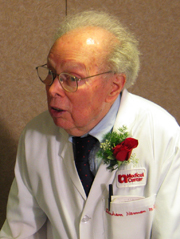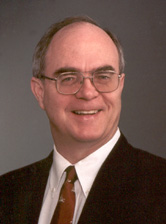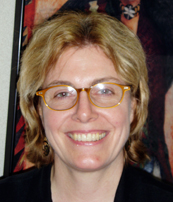Four UNMC researchers will receive the 2006 Internal Medicine Research Awards for exceptional achievements in research. The researchers and their awards are:
- Denham Harman, M.D., Ph.D., section of geriatrics and gerontology — Lifetime Research Award
- James Armitage, M.D., section of oncology/hematology — Career Excellence Award
- Jennifer Larsen, M.D., chief, section of diabetes, endocrinology and metabolism — Clinical Research Award
- Daniel Anderson, M.D., Ph.D., section of cardiology — Fellowship Research Award
The awards will be presented Friday, June 9, during the special internal medicine grand rounds at noon in the Durham Research Center Auditorium. Three of the award recipients will have a poster on display beginning at 11:30 a.m. in the building’s atrium. A grand rounds presentation by Dr. Armitage will follow the awards presentation.
 |
Denham Harman, M.D., Ph.D. |
As a result, Dr. Harman, UNMC Emeritus Millard Professor of Medicine, will receive the first ever Department of Internal Medicine Lifetime Research Award on June 9 for his extraordinary scientific career. Dr. Harman joined the UNMC faculty in 1958. Though he formerly retired in 1986, Dr. Harman continues his research at UNMC.
The Department of Internal Medicine annually selects faculty and trainees to honor for their research achievements. This year, the Department’s Research Council decided a special award should be created for Dr. Harman because his work resulted in a fundamental observation that essentially created a whole new area of biomedical research in free-radical biology. Even in his retirement, Dr. Harman has remained an active participant in academic life and is seen nearly weekly at Internal Medicine Grand Rounds.
“Dr. Harman has been recognized by many national and international organizations for his work and we wanted to make certain he knew that his academic department also appreciated both his remarkable work and long-term commitment to UNMC,” said Dr. Romberger, vice chairwoman for research for UNMC’s Department of Internal Medicine.
Known internationally as the father of the free radical theory of aging, Dr. Harman proposed that free radicals, highly reactive molecules freed in the normal chemical processes, cause aging and disease through their destructive actions in cells and tissues.
His 1954 theory, first ridiculed and dismissed by many in the scientific community, gained support by the 1960s, and by the 1980s was considered one of the principal theories of aging.
Dr. Harman proposed the theory while working as a research associate at the Donner Laboratory of Medical Physics at the University of California, Berkeley-a position he took after finishing his residency. Years later, in laboratory mouse models, Dr. Harman employed antioxidants such as vitamins E, C and beta carotene to reduce the cancer-causing and atherosclerosis-causing effects of free radicals.
Beginning with an interest in the basic mechanisms of aging, his work has produced insights into potential means to delay age-related conditions and most recently has turned to mechanisms involved in Alzheimer’s disease. Dr. Harman’s theory laid the groundwork for a great deal of research and interest in the aging process, and the discovery of the potential of antioxidants to fight off cancer, heart disease and other degenerative effects of aging.
 |
James Armitage, M.D. |
He has been an editorial board member, co-editor, or associate editor for more than 31 peer-reviewed journals. He has given more than 20 named lectureship presentations around the country and the world. Since 1971, as a medical student, he has been first author on approximately 100 papers and has contributed on more than 400 articles altogether. Dr. Armitage has written or co-authored 88 book chapters, books, or monographs, and has edited or co-edited more than 20 books.
Dr. Armitage graduated from medical school and did his internal medicine residency at UNMC. He then did his fellowship in oncology/hematology at the University of Iowa. He was the director of the Bone Marrow Transplant program at the University of Iowa before being recruited back to UNMC in 1982. He was instrumental in creating the Bone Marrow Transplant program at UNMC, which developed into an internationally known program.
Dr. Armitage has held several administrative roles in the UNMC Department of Internal Medicine and the College of Medicine, including vice chairman (1982-1990), section chief of oncology/hematology (1986-89), chairman (1990-1999), and dean of the College of Medicine (2000-2003). He was central in the development of the cooperative care model in transplant, pioneered in The Lied Transplant Center.
In addition to his roles as a physician, clinical investigator and administrator, he is well-known to students and residents as a superb teacher and past recipient of the Sir William Osler Teaching Award in the Department of Internal Medicine. Highlights of his other honors include selection into Alpha Omega Alpha, Central Society for Clinical Research, the University of Nebraska Outstanding Research and Creative Activity Award, Fellow of the Royal College of Physicians and Association of American Physicians.
 |
Jennifer Larsen, M.D. |
Her own initial National Institutes of Health-funded research was focused on prolactin signal transduction, but subsequently shifted to patient-oriented clinical research evaluating the metabolic consequences of organ transplantation, particularly vascular disease risk after transplantation. Dr. Larsen continues to maintain a laboratory that she uses for translational research, including the study of effects of immune suppressant medications on insulin action.
Over the past several years, Dr. Larsen has been instrumental in developing a relationship between UNMC, the Aberdeen Area Tribal Chairman’s Health Board, and the Northern Plains Tribal Epidemiologic Center that has resulted in funding through a Native American Research Center for Health (NARCH) grant. She serves as program director of the NARCH grant, as well as primary investigator for one of the funded projects.
Dr. Larsen also played important roles with several national organizations. She served as a member of the American Diabetes Association on its position statement on pancreas and islet transplantation; as a member of the NIH review team for the Pancreas Transplant Database contract; on the 2003 National Kidney Foundation task force on Diabetes and Kidney Transplantation; as a member of the Juvenile Diabetes Research Foundation review team for the most successful NIH-JDRF funded Edmonton, Canada, islet transplant program; and on the NKF task force for the evaluation of the Living Donor for Kidney Transplantation program in 2004.
She was president of the Midwest American Federation of Clinical Research and has served on its national council and as its public policy co-chair. She has served on a number of Endocrine Society committees including being the clinical chair of the Annual Meeting Steering Committee for the 2006 Annual Endocrine Society meeting.
Finally, Dr. Larsen has been a clinical research mentor for at least 40 fellows, residents, medical students and pre-medical students throughout her career. From 1997-2005 she served as the UNMC Endocrinology fellowship director and was a member of the Association of Program Directors of Endocrinology and Metabolism (APDEM) task force to define the research requirement for all endocrinology fellowship programs. She served as a member of the National Council for APDEM from 2002-2005. She has been a committee member for six Ph.D. or master’s thesis students. Dr. Larsen developed and directs a two-week CRC Clinical Research course that is required for all clinical fellows as well as being available to other research personnel and faculty.
 |
Daniel Anderson, M.D., Ph.D. |
His nominator for the Fellowship Award said: “He is extremely motivated and enthusiastic about the process of scientific discovery. As a physician-scientist, he brings the necessary elements for success including persistence, dedication, understanding, insight and ingenuity.”
These qualities are evident by the awards he already has received. Dr. Anderson was awarded a USCAP Young Investigators Award in 1995, the Thomas Jefferson Ingenuity Award in 1996, and an ACP-ASIM travel award in 2000. He was named House Officer of the Year in 2001, was awarded the Cardiology Fellow Teaching Award in 2004, and was awarded the Best Poster Presentation in the Basic Science Category at the ninth annual Cardiovascular Research Symposium for his work on complement activation in vascular inflammation.
Dr. Anderson has been first author on two manuscripts in the Journal of Virology and a contributing author on six other papers. He has contributed on one book chapter, and has participated in 20 abstracts — seven of which he was the first author.
Dr. Anderson has applied for an NIH training grant and a combined American College of Cardiology Foundation/industry training grant. As a matter of fact, Dr. Anderson has put in five applications even before he starts his faculty position this summer.